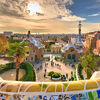14 Nights | Europe
About Greenwich, United Kingdom
You will visit the following 9 places:

Seville
Seville is the artistic, cultural, and financial capital of southern Spain. It is the capital of the autonomous community of Andalusia and of the province of Seville. It is situated on the plain of the River Guadalquivir, with an average elevation of 7 metres (23 ft) above sea level. The inhabitants of the city are known as sevillanos (feminine form: sevillanas) or hispalenses, following the Roman name of the city, Hispalis. The tapas scene is one of the main cultural attractions of the city: people go from one bar to another, enjoying small dishes called tapas (literally "lids" or "covers" in Spanish, referring to their probable origin as snacks served on small plates used to cover drinks). Local specialities include fried and grilled seafood (including squid, choco (cuttlefish), swordfish, marinated dogfish, and ortiguillas), grilled and stewed meat, spinach with chickpeas, Jamón ibérico, lamb kidneys in sherry sauce, snails, caldo de puchero, and gazpacho. A sandwich known as a serranito is the typical and popular version of fast food.

Lisbon
The capital of Portugal, Lisbon (Portuguese: Lisboa) has experienced a renaissance in recent years, with a contemporary culture that is alive and thriving and making its mark in today's Europe. Perched on the edge of the Atlantic Ocean, Lisbon is one of the rare Western European cities that faces the ocean and uses water as an element that defines the city. Lisbon enchants travellers with its white-bleached limestone buildings, intimate alleyways, and an easy-going charm that makes it a popular year-round destination.

Porto
Porto (also known as Oporto in English), is the second largest city in Portugal after Lisbon and one of the major urban areas of the Iberian Peninsula. The urban area of Porto, which extends beyond the administrative limits of the city, has a population of 1.4 million (2011) in an area of 389 km2 (150 sq mi), making it the second-largest urban area in Portugal. Located along the Douro river estuary in Northern Portugal, Porto is one of the oldest European centres, and its historical core was proclaimed a World Heritage Site by UNESCO in 1996. The western part of its urban area extends to the coastline of the Atlantic Ocean. Its settlement dates back many centuries, when it was an outpost of the Roman Empire. One of Portugal's internationally famous exports, port wine, is named for Porto, since the metropolitan area, and in particular the caves of Vila Nova de Gaia, were responsible for the packaging, transport and export of the fortified wine. In 2014, Porto was elected The Best European Destination by the Best European Destinations Agency.

Barcelona
Barcelona – Spain's enchanting capital, second largest and most populous city. It is a huge city that vibrates with life, and there’s certainly not another city in the country to touch it for its sheer style, looks or energy. It is one of the world's leading tourist, economic, trade fair and cultural centers, and its influence in commerce, education, entertainment, media, fashion, science, and the arts all contribute to its status as one of the world's major global cities. Barcelona is home to masterpieces of many great architects – the most famous of which is Antoni Gaudí.

Greenwich

St-Malo

Honfleur
Honfleur is a commune in the Calvados department in northwestern France. It is located on the southern bank of the estuary of the Seine across from le Havre and very close to the exit of the Pont de Normandie. The most picturesque of the Côte Fleurie's seaside towns, its inhabitants are called Honfleurais. It is especially known for its old, beautiful picturesque port, characterized by its houses with slate-covered frontages, painted many times by artists, including in particular Gustave Courbet, Eugène Boudin, Claude Monet and Johan Jongkind, forming theécole de Honfleur (Honfleur school) which contributed to the appearance of the Impressionist movement. The Sainte-Catherine church, which has a bell tower separate from the principal building, is the largest church made out of wood in France.

Rouen
Rouen is a city on the River Seine in the north of France. It is the capital of the region of Normandy. Formerly one of the largest and most prosperous cities of medieval Europe, Rouen was the seat of the Exchequer of Normandy during the Middle Ages. It was one of the capitals of the Anglo-Norman dynasties, which ruled both England and large parts of modern France from the 11th to the 15th centuries. An important city in the Roman era and Middle Ages, it has Gothic churches and a cobblestoned pedestrian center with hundreds of medieval half-timbered houses.

Cherbourg
Cherbourg-Octeville is a city and former commune situated at the northern end of the Cotentin peninsula in the northwestern French department of Manche. Due to its union, it is the most populated city in its department with 37,121 inhabitants making it the first city of the department before the Saint-Lô prefecture and the second in the region after Caen. Cherbourg-en-Cotentin is protected by Cherbourg Harbour, between La Hague and Val de Saire, and the city has been a strategic position over the centuries, disputed between the English and French. Cited as one of the "keys to the kingdom" by Vauban, it became, by colossal maritime development work, a first-rate military port under the leadership of Louis XVI and Napoleon, and holds an arsenal of the French Navy. A stopping point for prestigious transatlantic liners in the first half of the 20th century, Cherbourg was the primary goal of US troops during the invasion of Normandy in 1944. Along with its use as a military, fishing and yachting port, it is also a cross-Channel ferry port, with routes to the English ports of Poole and Portsmouth, the Irish port of Rosslare Harbour and St Helier on Jersey. Limited by its geographical isolation from being a great commercial port, it is nonetheless an important shipbuilding centre, and a working-class city with a rural hinterland.










